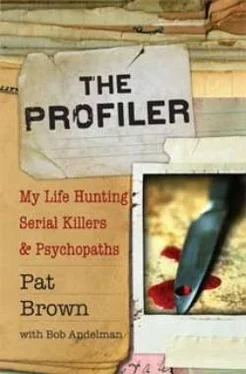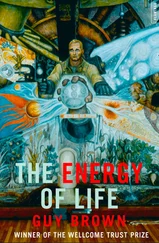There are only so many ways to kill a woman. You strangle, you stab, you beat her to death, maybe you shoot her, but that’s it. So when you input that, you’ve got a whole lot of strangled dead women in the bushes. That’s not going to help. The way it is being done with ViCAP isn’t winning any popularity contests with local law enforcement.
What they don’t have is a suspect bank. I’ve been lobbying for a system in which a detective doing an investigation could input the name of a suspect or a witness connected to a crime, or toss in the name of a friend, workmate, or relative of the victim, then, bam, they could see if that name came up in connection with another crime. It is amazing how often a suspect will be interviewed at different times and by different police departments but nobody knows about that until after the killer is convicted of a homicide.
Suppose Walt Williams moved to San Diego and his female neighbor went missing and soon turned up dead. The police knock on all the doors of the residents on the street and Walt is living in one of the houses. The police have a little chat with him and when they get back to the station, they input all the names of the folks on the street, including Walt’s. His name gets flagged!
“Whoa, wait a minute here! This Walt Williams was a suspect in the homicide of an Anne Kelley two decades ago in Maryland!” Wouldn’t that be useful to know?
But what actually happens is that a potential suspect moves from jurisdiction to jurisdiction, and while he could be interviewed in five separate crimes, not one investigator will have a clue that he was interviewed in the other incidents unless there is a conviction.
That’s the state of affairs of serial homicide in the United States. And that’s why, even though I was already over forty years old when I took up profiling, I still believed I could make a difference. I thought the status quo was just not acceptable.
But how does a former housewife change an entrenched criminal and political system, much of which is rather militaristic, almost all male, and well guarded? There are fragile egos and jurisdictional challenges at play. Sometimes it’s as simple as balancing well-meaning but divergent views of the same evidence or suspect.
There are plenty of dedicated, wonderful police officers who are overworked and undertrained. There are thousands of men and women who do their best, day in and day out, with limited resources. These deficiencies contribute to the high level of unsolved homicides. Some do amazing work, solve difficult crimes, and are role models for others in law enforcement. But unfortunately, as in every organization, there is always a percentage of people who are simply not that good. There are incompetent professionals in every walk of life. Not every police officer is top-notch, so there will be cases that go under just because the detective working them isn’t the brightest bulb, and that’s unfortunate.
I HAVE NO issue with where I came from. I don’t feel I need to apologize for being a homemaker in my life. I loved being a homemaker, and I think homemaking is a wonderful contribution, one of the finest contributions, to a community and to the family. I’m entirely supportive of homemaking. I think it’s fabulous. I don’t regret a day that I was a homemaker or a day of homeschooling my kids. I loved being home with my children. I’m not one of those people who wishes I hadn’t done it. I loved it and I am thankful I was fortunate enough to have had the choice to stay home.
But I can’t walk away from something if I feel that it’s my duty as a human being to do something about it.
Some people don’t care, some think they can’t do anything about the system. They don’t feel qualified or competent to act. They just feel that they’re not going to make a difference, so there’s no point in trying. And there are some who are afraid. They think if they get involved, bad things will happen to them, which is a realistic and logical thing to think. In many circumstances, when you do stick your head out, it gets chopped off.
My belief system requires me to act, damn the consequences.
I am passionate about the things I believe in. I’m passionate about children. I am passionate about women and their right to have a safe and abuse-free life. I believe in justice.
There are twenty or thirty more years of work ahead of me for changing serial homicide methodology and criminal profiling in this country. I’m only at the halfway point. I’ve got a long way to go, and hopefully I’ll live long enough to accomplish the rest of it. My mother turns ninety this year and my father will turn eighty-six and they still ballroom dance, so my genes are pretty good! But I know change is a group project and more people will come along the trail and will take up the work, and I welcome more profilers and police detectives to evolve methodologies and make a difference in our closure rate.
The whole point is to save more lives, because nobody deserves to die like Anne Kelley. No family deserves to have their loved one murdered-their dreams and hopes ruined and dashed. It should make everybody who hears this story so angry that they want to find a way to assist law enforcement and put an end to these senseless killings.
None of these murdering bastards should exist, and if they get away with it one time, we may be able to claim we were caught unaware. But when it happens over and over again, that is another thing altogether. Fool me once, shame on you; fool me twice, shame on me. We should be ashamed of ourselves, because we’ve been fooled over and over and over by serial and other types of killers. We refuse to open our eyes and recognize what does and does not work and where we need to put our money and support.
Hopefully, this will change.
I would like to thank each and every person who believed in me, my message, and my mission.
In particular:
My sister Joyce, who was always there for me and never questioned my decisions;
My parents, who quietly supported me;
My children, Jennifer, David, and Jeremy, who never complained about the time I spent away from them to do this work;
My dearest friend, Terry Pazmino, who listened to me year in and year out;
All my friends in Maryland and Minnesota, who kept me sane;
My assistant, Donna Weaver, whose tireless volunteer work for the Sexual Homicide Exchange kept the organization alive;
The victims and the families of victims who came to me for help and have never given up their quest for justice;
The detectives who have brought me in and been willing to give criminal profiling a chance;
The television networks, news programs, and hosts who often invite me to educate their audiences about the pressing issues of crime and let me share my views on the notable cases of the day: Nancy Grace, Jane Velez-Mitchell, Larry King, the Today show, The Early Show, Fox and Friends, Montel Williams, and the many other shows on CNN, MSNBC, Fox, the Discovery Channel, and Court TV that have me on, time and time again;
My coauthor, Bob Andelman, for helping me bring all these cases together in a coherent manner;
My agents, Jane Dystel, Miriam Goderich, and Michael Bourret, who had confidence this story should be told;
And, of course, the editors at Hyperion Voice, Barbara Jones and Elizabeth Sabo, who acquired my story and brought this book to the public.
My deepest gratitude to all.
– Pat Brown
Working with criminal profiler Pat Brown has been a unique and rewarding experience for me on a professional level. I’d also like to acknowledge her patience and support during the early days of putting The Profiler together. Thanks for sticking with me, Pat.
Thanks, too, to my agents at Dystel & Goderich Literary Management, Jane Dystel, Miriam Goderich, and Michael Bourret, for recommending me to Pat, and to Barbara Jones and Elizabeth Sabo for making this one of the best and most professional experiences of my career to date.
Читать дальше












